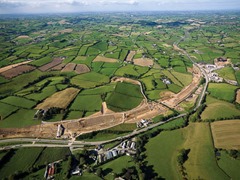Greg Lloyd: why planning matters
 Land is a finite resource which needs to be used for the common good, writes Greg Lloyd. Planning is the process that allows for society to debate and decide what is in the best interests of a community.
Land is a finite resource which needs to be used for the common good, writes Greg Lloyd. Planning is the process that allows for society to debate and decide what is in the best interests of a community.
The subject of land use planning remains a controversial issue across the devolved UK and perhaps no more so than in Northern Ireland. Compared to elsewhere, planning reform is lagging here – and this is not the time for this to be happening.
There are serious challenges ahead in terms of mediating uncertain economic conditions, enabling improved social and community relations, enabling appropriate infrastructure and addressing screeds of environmental risks. In brief, Northern Ireland needs planning reform to facilitate a stronger common weal.
Not surprisingly perhaps, there are different views about what the land use planning system should be doing to encourage economic well-being and recovery. This spectrum of opinion reflects very specifically drawn views on the use and development of land in Northern Ireland.
This suggests there needs to be broader conversations about what we mean by economic development and the incorporation of appropriate metrics for social values and environmental well-being.
Put bluntly, land and the environment together with intrinsic natural resources is a finite, fixed and vulnerable resource.
It requires appropriate management and regulation to ensure that all interests in Northern Ireland are best served.
We need land for a range of services – whether housing, retailing or commercial uses together with green and open spaces, agriculture and forestry – and we need to allocate land for
key infrastructure, including energy production, distribution and storage. We also need to think of future generations.
Strategic perspective
At this stage in the maturation of the new planning legislation, the imminent introduction of new local authorities, the transfer of land use planning responsibilities to the new bodies, together with related tasks around community planning and the recent turn of events around the Planning Bill, it is time to reflect on the wider context.
First, and whilst it may appear contrarian to do so at this stage in the planning reform process, it is important that we remind ourselves of the role of the land use planning in a modern society. It remains grotesquely misunderstood and misrepresented by various communities of interest, place and identity in Northern Ireland and beyond.
Land use planning has the specific purpose of regulating the use and development of land to protect private property rights, to serve the public interest and to enable a wider civil engagement about the future of communities and localities.
It has a very specific role in advanced market capitalist economies – which are complex and contested – and which are largely dominated by private property interests. It is to present a strategic perspective on the ways in which land is needed for economic (restructuring, growth, decline), demographic (growing, ageing, living less well), social (infrastructure and community facilities) and environmental (development, conservation) purposes.
It is to promote the appropriate forward vision for land use and development and to ensure certainty, consistency and confidence for property interests.
Land use planning is an essentially political activity which strikes at the heart of state-market-civil relations. It is therefore a contested arena with different interests seeking to capture it or resist it. This applies to both its development planning and its development management aspects. Neo-liberal thinking creates a politics of resistance around what is perceived as the government failure of land use planning – and fails to recognise the forward-looking, organisational and strategic dimensions of the management of change.
Second, we must be alert to lessons from elsewhere. Land use planning reform is taking shape across the devolved UK. These processes of change are driven very much by similar arguments to those which have been proclaimed in Northern Ireland – the perceived need to secure a more effective, efficient and open land use planning system.
Yet the ways in which England, Wales, Scotland and Northern Ireland are changing differ. The differences reflect history, culture, experience, governance and relative land and property development performances. Yet there are lessons on what to consider in Northern Ireland and what to avoid.
In England, there is an explicit drive to promote the power of local interests and property development. In Wales, planning reform is linked to community well-being and regeneration. In Scotland, there is a well advanced development of strategic planning through a National Planning Framework which has statutory force and drives an integrated, consistent and proportionate regulatory system.
Third, land use planning reform in Northern Ireland is inextricably bound up with its history and as a consequence there are serious questions here that need to be addressed. Land use planning reform is not taking place in a vacuum. It will affect particular geographies across Northern Ireland, localities and neighbourhoods in different ways.
The governance system in which it will operate is fragmented; central-local relations are complex. Land use planning is isolated from strategic thinking such as regional development and urban regeneration.
This needs to be challenged and consolidated. Reform is bound up with the immense challenge with respect to securing the decentralisation of local government, transfer of land use planning and the introduction of community planning.
What is Northern Ireland planning for? This brings into play important questions around legacy, current conditions and future expectations.
Are we planning for economic recovery? If so, what will it look like and when will it happen? What are the implications of the core-periphery geography in the UK economy?
Are we planning for a flat-lining economy? If so, how will Northern Ireland address questions of demographic change and the associated facilities and amenities of an older population?
Are we planning for no growth? If so, what do we need to do to protect the vulnerable groups in society?
Land use planning matters. There is a past, a present and a future. We need to address all of these facets. At the moment, we are in limbo.
We need a dramatic culture change in understanding what role land use planning plays in Northern Ireland. We need confidence in the new arrangements and clarity about the new local authorities.
We need conversations about what we should be doing to ensure the full bodied engagement with the future public interest in Northern Ireland. This needs a political champion and robust leadership. Nothing else will do.
Professor Greg Lloyd is Head of the School of the Built Environment at the University of Ulster.






